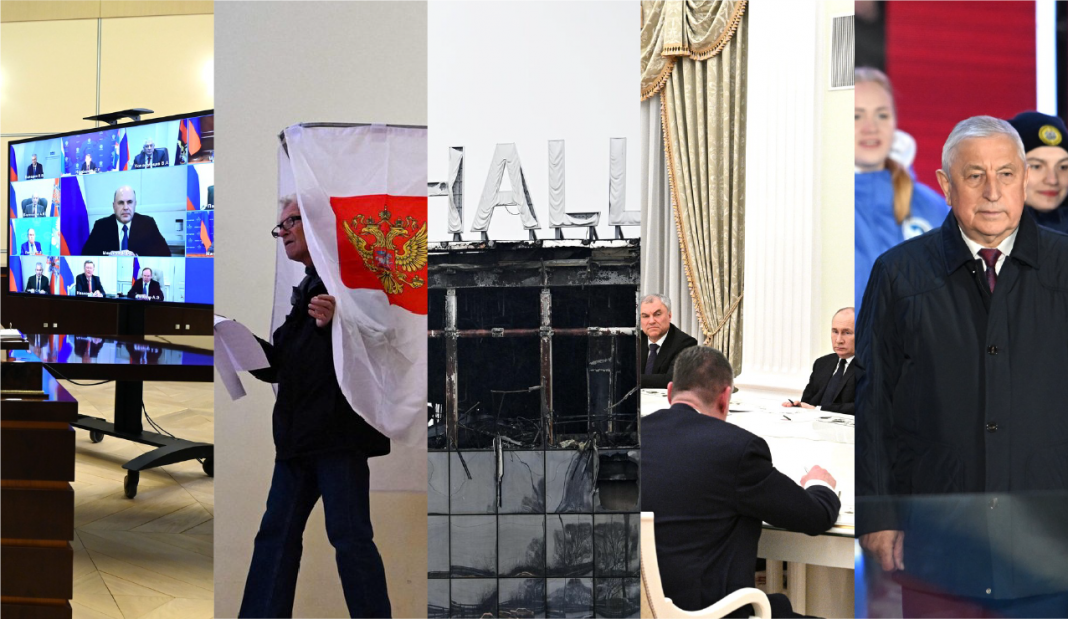This report describes the key events which significantly influenced Russia’s political, economic, and social processes.
Assessing the past week’s results, we determine the following trends:
- The terrorist attack at Crocus City Hall, in terms of the number of deaths, became the biggest terrorist attack in the history of Russia. He showed that Russia, having focused on resolving the “Ukrainian issue,” slept through other vital issues – in particular, a new possible surge of Islamic fundamentalism in the country. Understandably, the Russian leadership wants to link what happened to Ukraine, among other things. So far, the only clues to this are two points – the detained terrorists were moving through the territory of the Bryansk region, which borders Ukraine (Putin said that the terrorists would have been provided with a window at the border), as well as an advertisement published on the website of the Ukrainian Embassy in Tajikistan about the recruitment of volunteers for a foreign legion. There is no other data linking Ukraine to the terrorist attack.
- The main point when assessing the results of the presidential elections in the Russian Federation should be the understanding that Putin does not care what the West thinks about the polls. He worked for results that he could present to the Global South, and there, they value a strong leader who knows how to unite his people. In this sense, all statements about violations, the undemocratic nature of the process, falsifications, and lack of competition have absolutely no meaning. For Putin, the main thing is to be recognised by China, India, Brazil, Türkiye and other significant players in the South. He achieved his goal.
- According to available data, Putin is preparing personnel changes in the FSB, in particular, replacing the current chief, Alexander Bortnikov, with either General Dmitry Shalkov (the current head of the control and audit department of the Administration of the President of the Russian Federation, in the past – deputy director of the FSB) or with General Sergei Korolev, Bortnikov’s current first deputy. The appointment of Yuri Kovalchuk’s son, Boris, as deputy head of the control and audit department of the AP, suggests that Shalkov may soon be transferred to a new position; it is possible that in the FSB.
This digest covers the following topics, which were the most relevant for Russia between the 18th and the 24th of March:
- Terrorist attack at Crocus City Hall
- The reaction of the global community to the results of the Russian presidential elections
- Concert to mark the tenth anniversary of the annexation of Crimea
- Meeting of the board of the FSB of Russia
- Meeting with leaders of parliamentary factions
- Address to citizens following the results of the presidential elections in Russia
- Meeting with permanent members of the Security Council
This Content Is Only For Subscribers
- Terrorist attack at Crocus City Hall
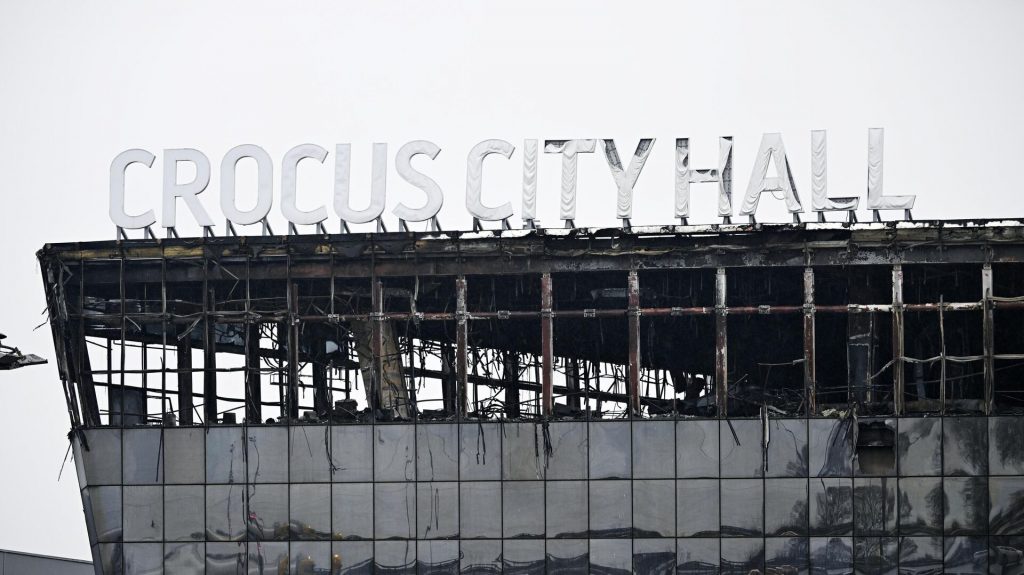
On Friday, March 22, a terrorist attack was committed in the Crocus City Hall concert hall located in the Moscow region during a mass event. According to official information, four citizens of Tajikistan, armed with automatic weapons and knives, entered the concert hall building and began randomly shooting at visitors. Later, terrorists set fire to the building, which led to a large fire and partial collapse of the roof. Later, it became known that the terrorists managed to escape from the scene of the terrorist attack, but a few hours later, they were detained in the Bryansk region.
According to official information, 137 people died as a result of the terrorist attack, and another 180 received injuries of varying severity. All alleged terrorists were detained, and as of the evening of March 24, investigative and operational procedures are being carried out with them.
Timeline:
- On Friday, March 22, at approximately 20:30 Moscow time, information appeared on the Internet that during a concert at Crocus City Hall, a man began firing from a machine gun, as a result of which about 30 people could have been injured.
- Later, video footage began to emerge showing that there were several shooters. They moved freely around the building and shot all visitors.
- Already at 20:45, information appeared about an intense fire at the site of the terrorist attack. The corresponding videos also began to spread massively online.
- Russian oligarch Konstantin Malofeev accused Ukraine of organising a terrorist attack in Crocus: “A terrible terrorist attack. After the last terrible terrorist attack, “Nord-Ost”, we won in Chechnya. We are ready to win again. Let’s give the civilian population of Ukraine 48 hours to leave the cities and finally end this war with the victorious defeat of the enemy. Using all forces and means.”
- A few hours after the terrorist attack, the White House Administration announced that Joe Biden was receiving all the latest information about the events in the Moscow region. The United States also said that it did not see any signs of Ukrainian involvement in the terrorist attack.
- A representative of the Main Intelligence Directorate of the Ministry of Defense of Ukraine, Andrei Yusov, blamed the Russian authorities for what was happening: “The events in Moscow are the handwriting of the Russian special services. And old. Remember Kashirskoye Highway, Nord-Ost, and then there was Beslan… nothing new. Western embassies warned of an impending terrorist attack. The Russian authorities, both then and now, needed to explain mobilisation for war to the population.”
- Deputy Chairman of the Russian Security Council Dmitry Medvedev also accused the Ukrainian authorities of organising the terrorist attack: “If it is established that these are terrorists of the Kyiv regime, it is impossible to deal with them and their ideological inspirers differently. All of them must be found and mercilessly destroyed as terrorists. Including officials of the state that committed such atrocity. Death for death.”
- In the first hours after the terrorist attack, official representatives of many countries (including Western ones) condemned the terrorist actions and also expressed condolences to Russian citizens. In particular, such statements were made by the USA, Germany, Austria, Great Britain, France, Italy, Poland, Greece, Türkiye, Belarus, Kyrgyzstan, Pakistan, Iran, Saudi Arabia, Qatar, Egypt, Cuba, Kazakhstan, Palestine, Venezuela, Armenia and Azerbaijan, UAE, Tajikistan, Spain, Syria. The UN and the European Union also issued statements.
- Information began to appear online that the terrorist organisation “Islamic State” (IS) had claimed responsibility for the terrorist attack. The world media widely distributed the screen with supposed evidence of this. Later, information appeared that the terrorist attack was organised by the Vilayat Khorasan group, an offshoot of the Islamic State operating in Afghanistan. The American publication Reuters confirmed the same version, citing its own sources. Later, other American media published similar information. At the same time, such information was not posted on the official pages of the terrorist organisation on social networks.
- On the morning of March 24, information appeared about the detention of terrorists in the Bryansk region. They managed to travel more than 200 kilometres and, when detained, tried to hide in the forest. Later, the Investigative Committee of the Russian Federation stated that the terrorists were travelling in the direction of Ukraine and allegedly planned to cross the border at a previously agreed-upon location. The detention itself took place a hundred kilometres from the Ukrainian border.
- During the arrest, one of the terrorists said that he was promised 500 thousand rubles for killing people. Another terrorist also stated that he had recently arrived from Türkiye, where, according to preliminary information, he could allegedly be recruited to carry out a terrorist attack.
- Russian Foreign Ministry Speaker Maria Zakharova also stated that the terrorists tried to hide in Ukraine: “Now we know in which country these bloody bastards planned to hide from persecution – Ukraine. The same country that, through the hands of Western liberal regimes, for ten years turned into the centre of the spread of terrorism in Europe, outstripping even Kosovo in an extremist frenzy.”
- Later, this information was denied by the representative of the Main Intelligence Directorate of the Ministry of Defense of Ukraine, Andrey Yusov: “This particular statement and this information, of course, is nonsense. It is impossible to imagine that after more than two years of a full-scale invasion, terrorists are sent to the border regions, which are now the most saturated with security forces and, special services and the military. I think that comments are unnecessary here.”
- French President Emmanuel Macron said that France strongly condemns the terrorist attack at Crocus City Hall and expresses solidarity with the Russian people.
- NATO spokeswoman Farah Dakhlallah wrote that the Alliance “unequivocally condemns the attacks on concertgoers in Moscow. Nothing can justify these heinous crimes. Our deepest condolences go out to the victims and their families.”
- German Foreign Minister Annalena Bärbock said after the terrorist attack in Crocus that Germany condemns “cowardly, inhuman terror anywhere” and sympathises with the people of Russia.
- At 15:30 Moscow time, Vladimir Putin’s address on the situation with the terrorist attack was published. Key theses:
- “In Moscow and the Moscow region, in all regions of the country, additional anti-terrorist and anti-sabotage measures have been introduced. The main thing now is to prevent those behind this bloodbath from committing a new crime.”
- “All four direct perpetrators of the terrorist attack, all those who shot and killed people, were found and detained. They tried to hide and moved towards Ukraine, where, according to preliminary data, a [path] was prepared for them to cross the state border on the Ukrainian side. A total of 11 people were detained. The Federal Security Service of Russia and other law enforcement agencies are working to identify and uncover the entire accomplice base of terrorists: those who provided them with transport, outlined escape routes from the crime scene, prepared caches, caches of weapons and ammunition.”
- “All perpetrators, organisers and customers of this crime will suffer fair and inevitable punishment. Whoever they are, whoever guides them. I repeat: we will identify and punish everyone who stands behind the terrorists, who prepared this atrocity, this blow against Russia, against our people.”
- “We know what the threat of terrorism is. We count here on interaction with all states that sincerely share our pain and are ready to join forces in the fight against a common enemy, international terrorism, with all its manifestations.”
- “Terrorists, murderers, non-humans, who do not and cannot have a nationality, face one unenviable fate – retribution and oblivion. They have no future. Our common duty now, our comrades at the front, all citizens of the country, is to be together in one formation.”
- In his evening address, Ukrainian President Vladimir Zelensky commented on the terrorist attack in Moscow and Putin’s statements that the terrorists planned to take refuge in Ukraine. In particular, he called Putin a “scumbag” and a “nonentity”: “What happened yesterday in Moscow Putin and other scumbags are simply trying to blame on someone else. They always have the same methods. It happened before. And there were blown-up houses, executions, and explosions. And they always blame others. They came to Ukraine, burned our cities, and they tried to blame Ukraine. Yesterday all this happened, and this nonentity Putin, instead of dealing with his citizens of Russia, addressing them, was silent for a day – thinking about how to attract this to Ukraine.”
- White House National Security Council representative Adrienne Watson once again stated that Ukraine has nothing to do with the terrorist attack in the Moscow Crocus City Hall concert hall. Watson also noted that responsibility for the terrorist attack lies entirely with the Islamic State.
- On March 24, Russia was in mourning. Most embassies in Moscow and other cities lowered their flags at half-staff as a sign of solidarity with Russia. The leaders of many states reiterated their condolences to the families and friends of the victims.
Outcomes and outlook:
The terrorist attack at Crocus City Hall became the largest terrorist attack in Russian history in terms of the number of deaths. He showed that Russia, having focused on resolving the “Ukrainian issue,” slept through other vital issues – in particular, a new possible surge of Islamic fundamentalism in the country. Understandably, the Russian leadership wants to link what happened to Ukraine, among other things. So far, the only clues to this are two points – the detained terrorists were moving through the territory of the Bryansk region, which borders Ukraine (Putin said that the terrorists would have been provided with a window at the border), as well as an advertisement published on the website of the Ukrainian Embassy in Tajikistan about the recruitment of volunteers for a foreign legion. There is no other data linking Ukraine to the terrorist attack.
Several factors are striking. Firstly, the terrorists have good combat and physical training (they feel confident, know the route well, and reload their weapons quickly and professionally). Secondly, they do not act like classic ISIS terrorists (there are no “martyr belts”, hostages taken captive, terrorist attacks dedicated to Allah, etc.). Their action looks irrational and senseless, focusing exclusively on the number of victims and the panic sowed. At the same time, having retreated from the crime scene without any problems, they make many absolutely trivial mistakes, for example, not even bothering to change the car in which they drove away from the shopping centre.
It is also striking that the terrorists reached the Bryansk region in record time (Friday, busy MKAD, roadblocks). This raises many questions as to whether the right terrorists were detained (even despite their confessions during the investigation and in court. Experts argue that such an operation should have at least 20-25 performers (training, cover, surveillance, etc.) This indicates the presence of a vast network of terrorist organisations within Russia.
The very fact of the terrorist attack indicates that such actions will become quite frequent shortly, and Russia will face the most severe factor of the Islamist threat, as well as Islamophobia in society. This could lead to increased xenophobia in society – especially in Moscow and other large cities, where people from Islamic countries make up a significant part of the population. Today, Islam is the second most widespread religion in the Russian Federation. The second point: it is evident that Putin’s speeches with hints addressed to Ukraine will strengthen the Russian Federation’s actions in this direction. All actions of the investigation will be aimed at identifying the “Ukrainian trace” in the terrorist act precisely, and this will give Moscow a reason to declare the terrorist essence of Ukraine as a state and the need to transfer the “special military operation” to the “anti-terrorist operation” mode.
Western states that supply Ukraine with weapons and other assistance will be declared “terrorist supporters,” which could lead to the strengthening of opposition (pro-Russian, Eurosceptic, anti-American and other) forces in Europe. Third, obviously, in Russia, soon, we should expect severe changes in the structure of the leadership of law enforcement agencies and a strengthening of the anti-terrorism regime within the country. Elements of a police state will be even more visible in society, and fighters of the Russian Armed Forces will receive an additional ideological incentive during the fighting in the Ukrainian direction.
- The reaction of the global community to the results of the Russian presidential elections
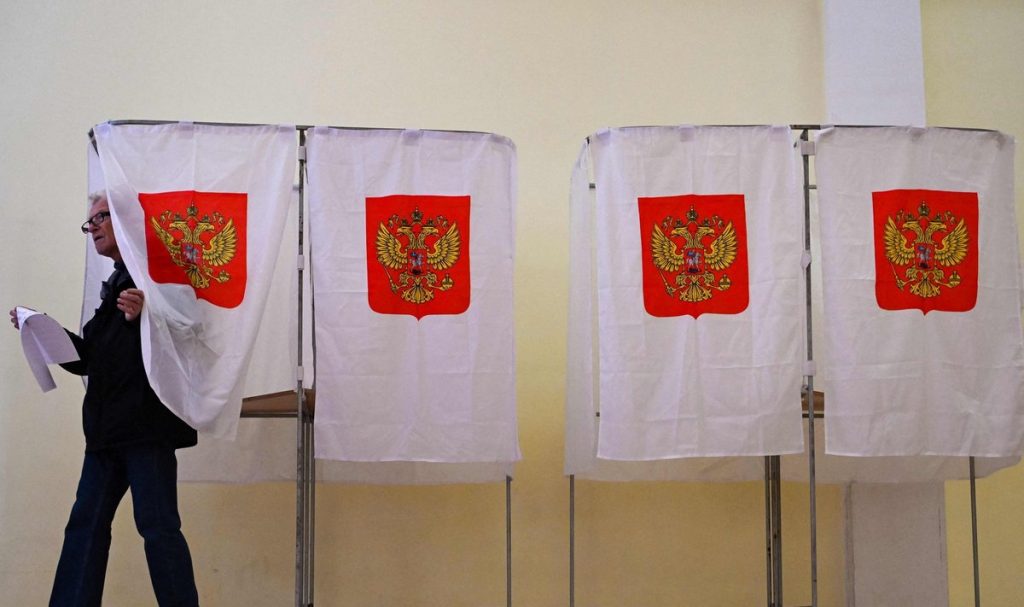
On Sunday, March 17, the presidential elections ended in Russia. According to preliminary data on the voting results, Vladimir Putin received more than 87% of the votes, demonstrating the highest result for the entire period of participation in the presidential elections. The global reaction to the election results, as expected, turned out to be very mixed. For example, the leaders of only 16 of 54 African states sent official congratulations to Putin (Algeria, Burkina Faso, Burundi, Central African Republic, Chad, Congo, DRC, Egypt, Eritrea, Libya, Mali, Morocco, Niger, SADR, South Africa, Tanzania, Zimbabwe ).
Among European states, only the leaders of Serbia, Hungary and Belarus congratulated Putin. At the same time, the majority of European Union member states signed a joint letter to the UN condemning the 2024 elections. Also, many states from other continents were among the signatories. There were 41 of them in total.
Reaction of other countries:
- South Korea refrained from commenting on the election and said it would “consider the ‘appropriateness’ of a possible congratulatory telegram to Putin.”
- Czech Foreign Minister Jan Lipavsky called the vote a “farce.”
- France’s Foreign Ministry said conditions for free elections had not been met, citing “increasing repression of civil society and all forms of opposition to the regime.”
- German Foreign Minister Annalena Bärbock said the “unelected” vote demonstrated “Putin’s brutal behaviour towards his own people.”
- The Latvian Foreign Ministry stated that “the so-called presidential “elections” held in Russia were neither free nor fair. Therefore, Latvia considers the 2024 “elections” of the Russian president to be devoid of any democratic legitimacy.”
- Moldovan President Maia Sandu said: “We cannot talk about free and fair elections when real opponents are excluded from the race.”
- The Norwegian Foreign Ministry said that “the fact that the Kremlin organised elections in parts of Ukraine illegally occupied by Moscow is a serious violation of international law.”
- Ukrainian President Vladimir Zelensky called the elections illegitimate: “Everyone understands that this man, like many others throughout history, is sick of power and will stop at nothing to rule forever. There’s nothing wrong he wouldn’t do to maintain his personal power.”
- British Foreign Secretary David Cameron said that holding elections in the occupied territory of Ukraine is illegal. He said the elections “clearly highlight the depth of repression by President Putin’s regime, which seeks to silence any opposition to its illegal war.”
- The US State Department said that Russia’s “presidential election” did not meet democratic standards and that Putin’s victory was predetermined while pledging support for Russian volunteers seeking a better future for their country.
Outcomes and outlook:
The main point when assessing the results of the presidential elections in the Russian Federation should be the understanding: Putin absolutely does not care what the West thinks about the elections. He worked for results that he could present to the Global South, and there, they value a strong leader who knows how to unite his people. In this sense, all statements about violations, the undemocratic nature of the process, falsifications, and lack of competition have absolutely no meaning. For Putin, the main thing is to be recognised by China, India, Brazil, Türkiye and other major players in the South. He achieved his goal.
The formula “we recognise, but do not congratulate,” proposed by the United States, is also absolutely acceptable to the official Kremlin. Be that as it may, despite the diplomatic equivocations of the West, Putin has again become a legitimate president in the eyes of the world community. And if in 2020, after the presidential elections in Belarus, the West really boycotted Alexander Lukashenko and also tried to recognise Svetlana Tikhanovskaya as the winner, then in this case, there was not a single attempt at a boycott, the West took note of the election results and made it clear that it would have deal with Putin in the next six years.
- Concert to mark the tenth anniversary of the annexation of Crimea
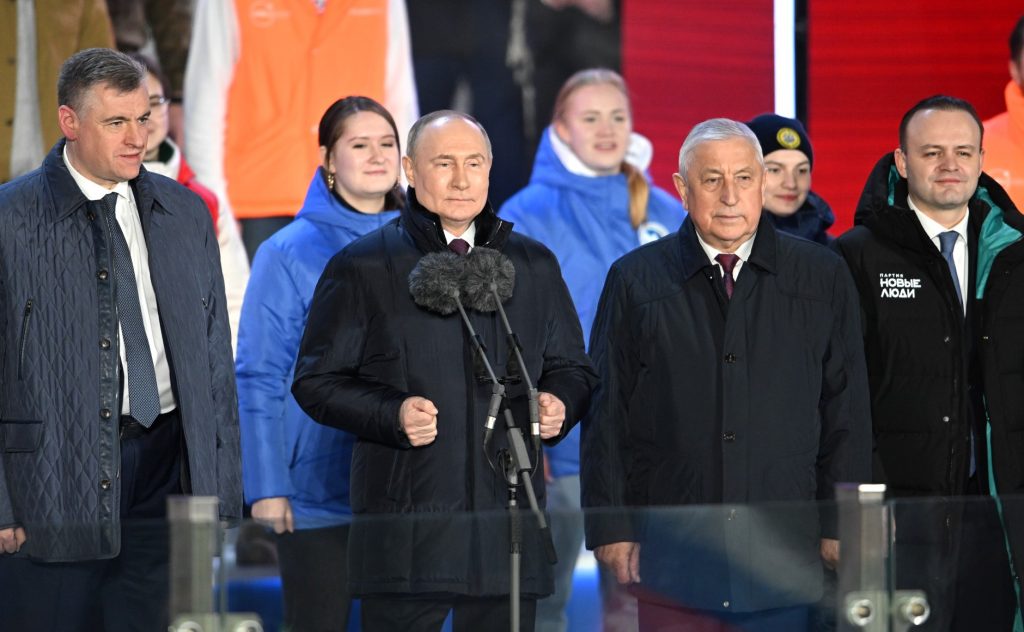
On Monday, March 18, a rally and concert were held on Red Square to mark the tenth anniversary of the annexation of the Crimean Peninsula by Russia. Vladimir Putin also took part in the event and addressed citizens with a congratulatory speech. Also, along with Putin, participants in the presidential elections (Nikolai Kharitonov, Leonid Slutsky, Vladislav Davankov), who had held a meeting in the Kremlin the day before, took the stage.
Key theses:
- “Exactly ten years ago, here on Red Square, moving to the same stage, I remembered that Crimea is often called an unsinkable aircraft carrier. This is what prompted the idea to say that Crimea has returned to its native harbour.”
- “But Crimea is not only a strategically important territory, it is not only our history, our traditions and the pride of Russia. Crimea is, first of all, people: residents of Sevastopol, Crimeans. They are our pride.”
- “But as for “Novorossiya”, as for Donbas: people living there, also then, in the days of the “Russian Spring”, declared their desire to return to their family. Their path to their homeland was much more difficult and tragic. But still, we did it, and this is also a great event in the history of our state.”
- “Like this – together, hand in hand – we will move on. This is what – not in words, but in deeds – makes us really stronger. And all this is happening thanks to you, citizens of Russia.”
Outcomes and outlook:
This is a propaganda campaign aimed at showing that despite the attempts of the West and Ukraine to return Crimea to legal jurisdiction, Russia is determined to consider it an integral part of the Russian Federation and is not going to compromise. The new expansion of Russia, the conquest of new territories—this is the path along which Russia intends to continue. Crimea is only the beginning of the restoration of Russian hegemony in Eurasia.
- Meeting of the board of the FSB of Russia
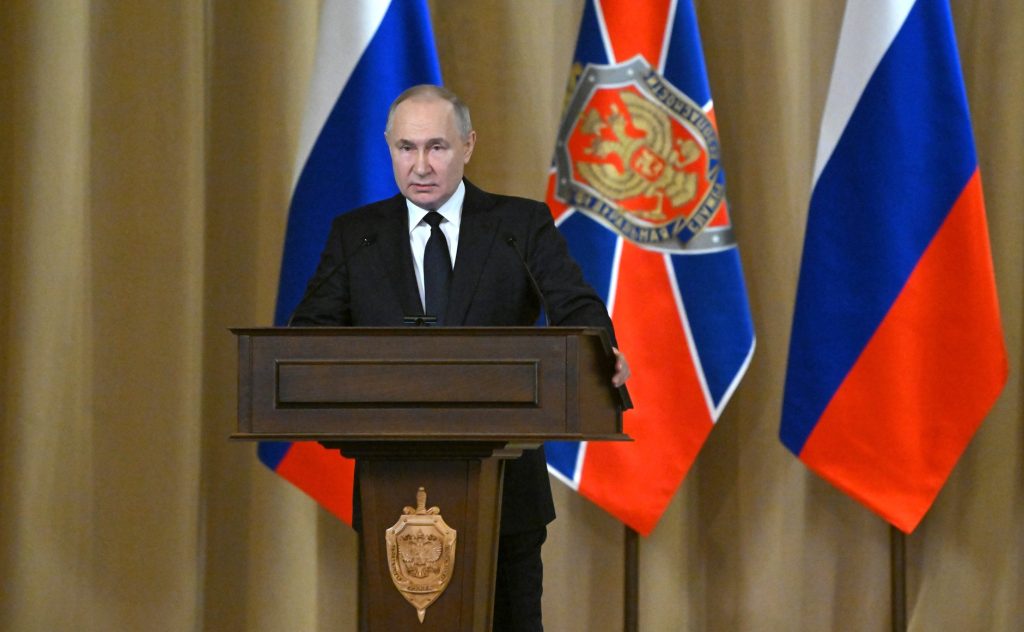
On Tuesday, March 19, Vladimir Putin took part in an extended meeting of the Federal Security Service’s board. During the meeting, the results of the FSB’s work over the past year were summed up, and the main goals for the next period were agreed upon. The Russian President addressed the meeting participants with a speech in which, among other things, he commented on the foreign policy situation.
Key theses:
- “In 2023, FSB officers competently and accurately acted in all their areas, confirming the high status and authority of the service as a key link in the system of ensuring state security and sovereignty of Russia.”
- “Special words to those responsible for the most difficult areas of work in the Donbas and in Novorossiya, who, at the risk of their lives, solved operational, combat missions of an intelligence and counterintelligence nature.”
- “The challenges we face, attempts to undermine our development, require us to systematically, consistently work in all areas. In the economy, technology, culture, social sphere, in strengthening our state and public institutions, and, of course, the most important guarantee of the successful solution of the identified tasks is the protection of the country’s sovereignty, the safety of our citizens, as I have said repeatedly, we all understand this, from both external and internal threats.”
- “At one time, the West actively used various kinds of cross-border radical terrorist groups to its advantage, including encouraging their aggression against Russia. Naturally, the “neo-Nazi Kyiv regime” – again with support, and often on direct instructions – switched to terrorist methods. These are shelling of peaceful cities, assassination attempts on government officials and public figures, attempts to recruit perpetrators of sabotage and terrorist attacks at critical Russian infrastructure facilities and in places where people are in large numbers.”
- “Let me also remind you of the recent, frankly speaking, provocative statements by several official Western structures about the possibility of terrorist attacks in Russia. All this resembles outright blackmail and an intention to intimidate and destabilise our society. You know this well; I won’t go into details now.”
- “I ask the FSB, together with other intelligence services and law enforcement agencies, under the coordination of the National Anti-Terrorism Committee, to seriously strengthen anti-terrorism work in all areas, understanding that we are dealing with a strong, dangerous enemy, in whose arsenal there are wide information, technical, financial capabilities, etc. “We know their capabilities in all these areas, including intelligence and terrorist methods.”
- “Recently, much has been done to strengthen the state border, especially areas that are actually located in areas of military operations. The border authorities have additional personnel, modern weapons and equipment.”
- “We see results. All attempts to break into our territory by sabotage and terrorist gangs consisting of regular enemy units, foreign mercenaries, are also actively used, and all kinds of scum, which through various channels ended up on the territory of the Kyiv regime – all these attempts failed.”
- “Enemy groups, according to available information, planned to stage a real terrorist raid on the border on the cities and towns of the Belgorod and Kursk regions, but were met with dignity, with fire, as they say, on the way, and have already suffered heavy losses, including armoured vehicles and artillery.”
- “We need to significantly expand the capabilities for a preventive response to such threats and strengthen the protection of the domestic information infrastructure. Here I ask you to actively work with both our science and domestic innovative business, using our significant achievements in areas such as digital, quantum, and artificial intelligence.”
Outcomes and outlook:
Putin, as a native of the FSB, pays special attention to the development and strengthening of the Federal Security Service of the Russian Federation. It is no coincidence that the meeting with the FSB board took place literally the day after the elections. There he again set tasks regarding the situation within the Russian Federation and regarding Ukraine (which is noteworthy: previously, the Ukrainian issue was raised mainly at meetings with the military). This may indicate a strengthening of the role of the FSB in the war with Ukraine.
According to public data, Putin is preparing personnel changes in the FSB, in particular, replacing the current chief, Alexander Bortnikov, with either General Dmitry Shalkov (the current head of the control and audit department of the Presidential Administration of the Russian Federation, in the past – deputy director of the FSB) or with General Sergei Korolev, the current first deputy Bortnikov. The appointment of Yuri Kovalchuk’s son, Boris, as deputy head of the control and audit department of the AP, suggests that Shalkov may soon be transferred to a new position; it is possible that in the FSB.
- Meeting with leaders of parliamentary factions
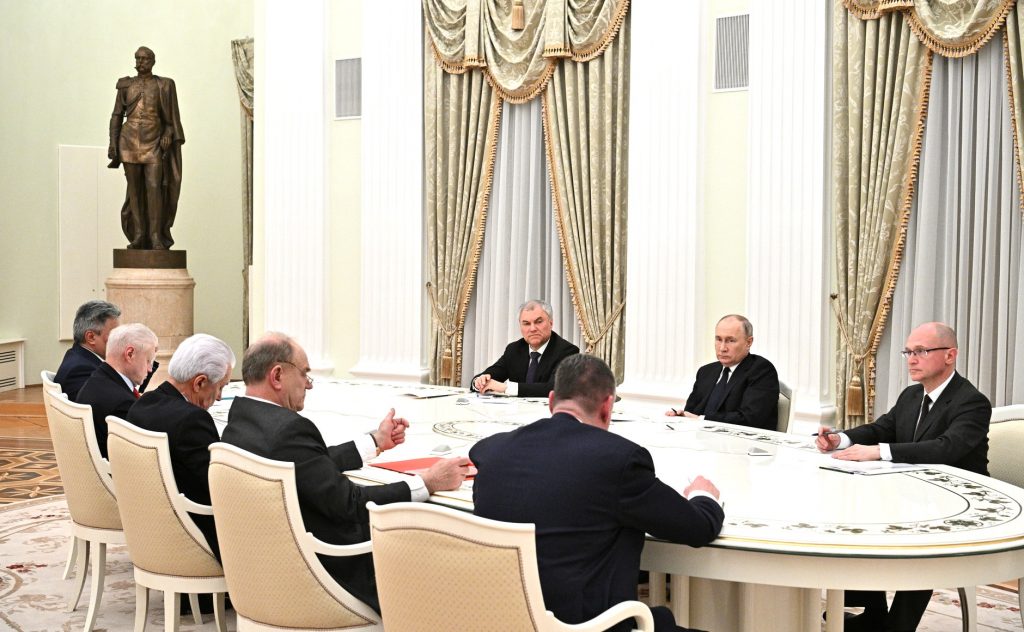
On Tuesday, March 19, Vladimir Putin met in the Kremlin with the leaders of factions of political parties in the State Duma. The meeting participants discussed the presidential election results and several domestic political issues. In particular, implementing the plans voiced in Putin’s recent Address to the Federal Assembly was actively discussed.
Key theses:
- Putin: “But the most important thing is saving people. This is helping our families, stimulating demographic processes, supporting young people, young families, families with children and, of course, large families, educating the younger generation, and all this can be done, of course, only based on economic development. This is a key issue for our development; it is the basis for the country’s development, on which all other issues of technological sovereignty and social development must be resolved. And this always causes disputes among our parties represented in the country’s Parliament, and this is normal, always their own opinion about what needs to be done and how to achieve social development goals.”
- Putin: “It is clear that disputes are inevitable. This is an obvious thing. Because if someone believes that his proposal is better than the proposal of others, he should fight for it. But I hope this struggle will take place in the same civilised manner as during the period we have just gone through.”
- Putin: “And finally, one more essential thing. Under the Constitution, with the updated Constitution, the Parliament is now assigned severe powers to form the highest executive body of power – the Government. You will approve not only the Chairman of the Government but also his deputies and ministers of the civil bloc. This is an essential and responsible thing.”
- Zyuganov (head of the Communist Party faction): “Vladimir Vladimirovich, you are starting with the best tradition that has long been formed – from a meeting with the leaders of parties and movements. In my opinion, the new term should continue this tradition. The series of meetings began with speeches by faction leaders. Everyone asked you to convey—this is practically the general opinion—congratulations. It wasn’t just elections that took place – it was a confirmation of positions, including, first of all, the Supreme Commander-in-Chief. For us now, the main task is to defeat Nazism, fascism, which has taken root in Ukraine and which is sweeping Europe. This is a matter of our historical survival.”
- Zyuganov: “I believe that a new reality is coming, which we must evaluate and unite as much as possible to solve these problems. First of all, there is a war for resources. There is, in fact, a tough confrontation with traditional values and our policies. Artificial intelligence is still ahead: if it falls into the hands of poorly educated, cynical people, it will be worse than the Nazi Reich. You have now paid special attention to the latest technologies.”
- Zyuganov: “As for the war against Nazism. I came across this: you served in Germany, and so did I. We had thousands of SS men in Gera; everyone was under control.”
- Zyuganov: “Denazification is a complex process that must begin primarily with personnel, schools and children. We’ll all have to work on this together.”
- Zyuganov: “But it [Nazism] is becoming more impudent, and what they have been doing lately in the adjacent territories, you understand, requires tougher, more specific and more decisive work. Therefore, we actively support the measures that you have outlined.”
- Zyuganov: “There are three conditions for victory: maximum mobilisation of forces and resources, unity of society and technological breakthrough. During the election campaign, I saw that you visited all large enterprises, primarily defence enterprises, and communicated with working people.”
- Zyuganov: “Political system. Your assistant, Kiriyenko, is present here. I have the right to say this. Yeltsin lived above me. I supervised Moscow, put out fires, and was in all wars in the Caucasus, Central Asia, and the Baltic states. The Americans imposed on us those orders that are called the “dashing 90s”. You know better than me. You recently had to answer a question about Navalny; you answered very sincerely, but Navalny also did not fall from the sky. I saw how some of your assistants dragged him to this “throne”. When he was nominated as a candidate in Moscow, I came and asked: do you understand what you are doing? You are now rounding up those whom the special services have prepared to blow up the country again, voters in Moscow. Sorry, almost 900 thousand were driven away, and then we thought what to do. Now a new cycle begins, a similar situation. No one needs him, absolutely no need. We need to show will and character here. We simply have to do this.”
- Vasiliev (head of the United Russia faction): “Priorities: in the first place, we put family, support [of families], youth, poverty reduction, which Gennady Andreevich spoke about and cited China as an example. Great, but we have our program, we have our own specifics. We must walk along it together, in concert. You will not let us evade anywhere, but we must do it, and you, as I understand it, must also participate in this in concert because the situation, as you emphasised, is not easy: the enemy is strong; he cannot be underestimated. He is trying to bring doubt into our ranks. I am convinced that you understand all this very well.”
- Mironov (head of the A Just Russia faction): “We saw in what unprecedented conditions the elections were held. We saw both the pressure of the collective West and the military intervention of the Ukronazis, who bombed and intimidated our people, but our people cannot be intimidated. I was in the Kherson region, and in the Zaporizhzhia region, I was in the Belgorod region, I was in the Bryansk region. People courageously went to the polls, realising they were choosing their country’s future.”
- Mironov: “We see that in the border regions – in the Belgorod region, Kursk – our soldiers, including the Russian Guard, do not allow the Ukronazis to cross our border and various sabotage and reconnaissance groups to infiltrate our territory. There is one nuance here, and I will also contact you in writing. The fact is that at one time, you fundamentally and very quickly resolved the issue regarding our border guards who work there. They now also have the status of a participant in a special military operation with all the ensuing consequences. And those who today are repelling attacks on the border – the Ministry of Defense and our National Guard – are not in equal conditions today. I won’t give numbers, but they really do the same thing. In this regard, I would ask you to consider the possibility for them to establish all additional payments so that they also receive them.”
- Mironov: “And with your special attention to demographic problems and the announcement of the Year of the Family, I think that if we had a special Ministry of Demography within the Government, it would be absolutely correct. For example, the question of introducing an increased coefficient to the amount of maternity capital in a region with a low birth rate. This is our proposal because we can look and make this situation work here.”
- Mironov: “The Constitution still has a provision on the possibility of dual citizenship. It seems to me that we need to return to this issue – let everyone decide: there should be one Motherland, and taxes should be paid here, in our Motherland. And if someone thinks differently, then, as people say, here’s God, and here’s your threshold.”
- Slutsky (head of the LDPR faction): “At the end of the presidential campaign, I want to thank all the leaders of parliamentary parties for their effective cooperation. We carried out this campaign very well. I am confident that now, effectively, shoulder to shoulder, without wasting time, as the current situation requires, we will solve those problems that people really pose. People are our main value and those we exist as political parties for.”
- Slutsky: “Regarding the reference points you have outlined: defence capability, demography, subjects, villages. Defence capability is critical, but ours is high. And you outlined the tasks, in the implementation of which we will also take the necessary efforts shoulder to shoulder so that the special military operation, the purpose of which is to complete the last battle with Nazism, launched against us by today’s Nazis on the territory of Ukraine, ends shortly with the victory of Russian weapons.”
- Slutsky: “You are absolutely right; it is now necessary to develop the regions and ensure that the standard of living in the regions – in all – is equalised so that living both in Moscow and regions far from Moscow is equally comfortable. It seems that now this problem is unsolvable. Nevertheless, the eyes are afraid, but the hands are busy, and in a few years, this problem and its solution can be qualitatively advanced. Perhaps we need to start with those who teach and heal us. We talked about the lack of doctors in the country, about 25 thousand doctors and 50 thousand paramedical staff. The new is the well-forgotten old. Mandatory distribution from medical universities and colleges in a couple of years will actually be able to bring this problem to a significant stage of resolution. We need to work on this with the Government. I think we can move forward in this direction over the next few months if you approve such work.”
- Nechaev (head of the “New People” faction): “Despite external pressure, especially in recent weeks, attempts – through the bombing of peaceful cities or minor provocations in certain areas – to somehow influence the elections in the country, we see that our people came, voted. In this sense, this is not only your victory; I think this is an expression of will – a common cause, a big victory for the whole country.”
- Nechaev: “Today, the VTsIOM [Russian Public Opinion Research Center] data came out; I brought it. Seventy-two per cent completely trust the results of the elections, and 13 per cent have doubts, as written. This is the fifth election in my life, and sociologists have always taught me that the higher the result, the higher the distrust. This election disproves their perception. This is a huge deal and a common success, especially for Russia.”
- Nechaev: “Interestingly, entrepreneurs feel that they are working for a common cause. This unites everyone, not only on the economic front. The impression is that it is important for them that there is a struggle for the future of Russia. Somehow people are accelerating, perhaps from the first months of the start of a special military operation. It is essential. They actively help the fighters of the [so-called] “SMO” with humanitarian aid and volunteer projects in new regions, including program rehabilitation. We have also prepared several projects. I would like to tell you about them today.”
Outcomes and outlook:
The meeting with representatives of parliamentary factions was intended to show the support of Putin’s initiatives on the part of the State Duma and the readiness to support those program directions and goals of Putin that were set out in his Address to the Federal Assembly. We are dealing with continuing the election campaign (by inertia). The main goal of such actions is to show the consumer of information the stability of goals: Putin did not just speak to promise citizens an improvement in life during the election campaign. He has not forgotten his promises and intends to implement everything said earlier.
- Address to citizens following the results of the presidential elections in Russia
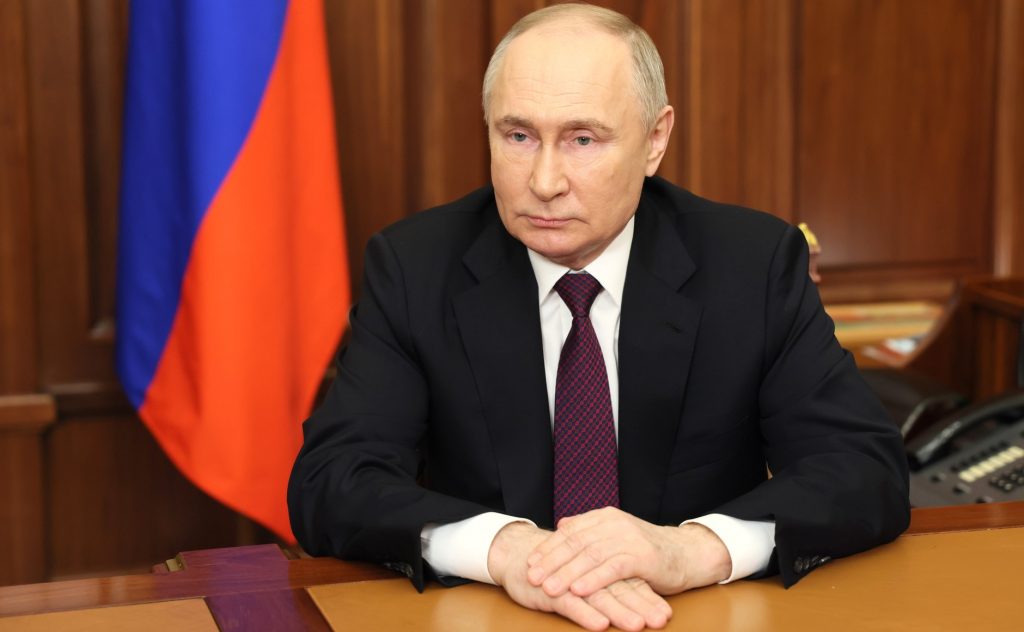
On Thursday, March 21, after the final results of the Russian presidential elections were announced, Vladimir Putin addressed citizens. During his speech he thanked everyone for participating in the elections, summed up the results of the election campaign, and also voiced a number of theses regarding the future political prospects of Russia.
Key theses:
- “Today, the official voting results for the Russian Presidential elections have been summed up. An extremely important election campaign for our country, society and citizens has ended. Each candidate had their own approach to solving specific problems. We will definitely use all constructive proposals and ideas resonating with voters in our common work in the interests of the country’s development.”
- “The last campaign was tense and extremely responsible because, by and large, we were choosing the path that Russia would take next, choosing the future for ourselves and our children. And the significance of this event was understood by the vast majority of voters who came to the polls.”
- “Thank you for your support. This is more important than a formal victory in the elections. This is support for our country’s political and economic course, our overall results, which, of course, should be greater, but today they are making Russia even stronger and more independent.”
- “The elections showed that Russia today is one big, friendly family. Let’s walk together along the historical path we have chosen. Confident in themselves, in their abilities and their future.”
Outcomes and outlook:
A ritual action that is typical for any president following the results of a successful election. Thus, Putin thanks his people for their support in the elections. This appeal did not have any additional political implications.
- Meeting with permanent members of the Security Council
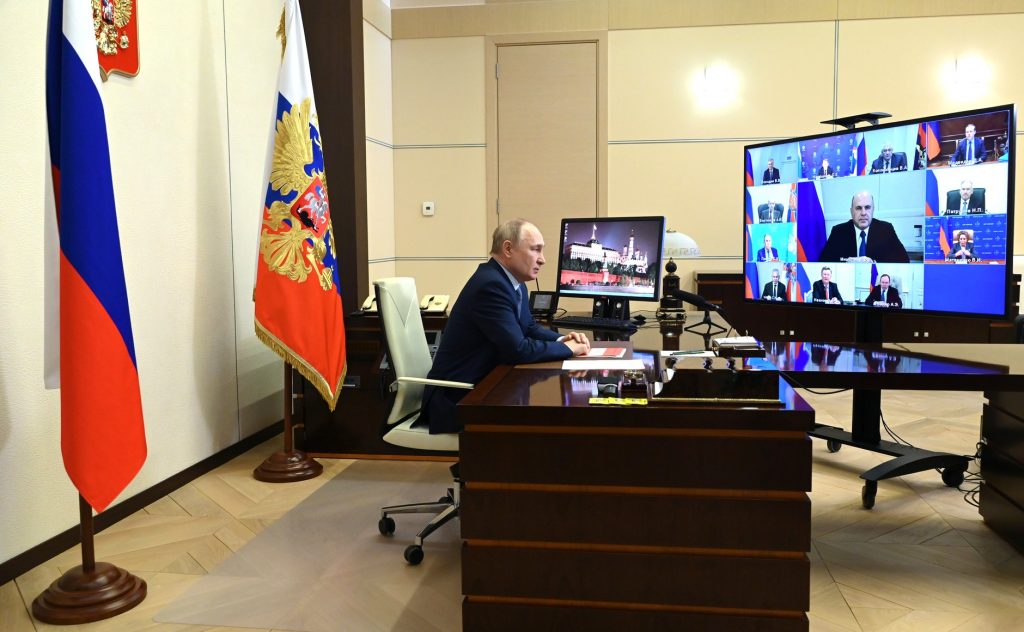
On Friday, March 22, Vladimir Putin held a traditional meeting with permanent members of the Security Council via videoconference. According to official data, the main topic of the meeting was measures to combat the spread of neo-Nazism ideas.
The meeting was attended by Prime Minister Mikhail Mishustin, Chairman of the Federation Council Valentina Matvienko, Chairman of the State Duma Vyacheslav Volodin, Deputy Chairman of the Security Council Dmitry Medvedev, Chief of the Presidential Administration Anton Vaino, Secretary of the Security Council Nikolai Patrushev, Minister of Internal Affairs Vladimir Kolokoltsev, Minister of Foreign Affairs Sergei Lavrov, Defense Minister Sergei Shoigu, Director of the Federal Security Service Alexander Bortnikov, Director of the Foreign Intelligence Service Sergei Naryshkin, Special Representative of the President on environmental issues, ecology and transport Sergei Ivanov.
Outcomes and outlook:
It is essential for Putin today to show that Russia is the main outpost in the fight against neo-Nazism and the revision of historical concepts relating to the Second World War. The main threat, according to Putin, comes from the West and Ukraine, where the revision of the ideology and practice of Nazism and fascism, as well as the revision of historical memory, have become the norm, despite the formal preservation of prohibitions on such actions in legislation). Putin sincerely hopes to turn next year into a year of preparation for the celebration of the 80th anniversary of Victory in World War II. Therefore, the denazification slogan will be the main slogan soon. Putin himself is following the path of creating his image as a neo-Stalin; the cult of Stalin will be revived in Russia, but at the same time, Ukraine is defined as a “breeding ground for fascism and Nazism” that must be ended. The old concept “Without Putin, what happened to Ukraine will happen to Russia” will continue to work in an ideological vein.

